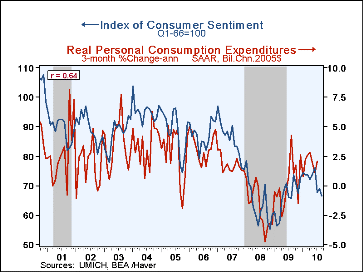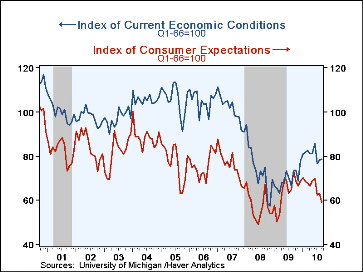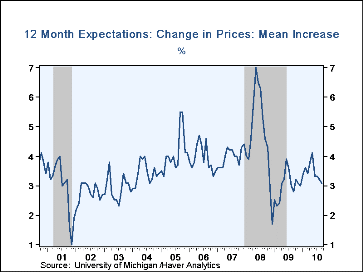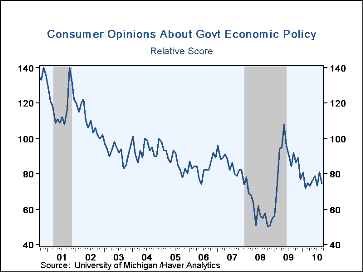 Global| Sep 17 2010
Global| Sep 17 2010Consumer Sentiment Grows Even More Glum
by:Tom Moeller
|in:Economy in Brief
Summary
In a renewed statement of discouragement, consumer sentiment fell again early in September. The University of Michigan reported that its mid-month reading reversed last month's uptick and fell to 66.6 which was the lowest level since [...]
In a renewed statement of discouragement, consumer sentiment fell again early in September. The University of Michigan reported that its mid-month reading reversed last month's uptick and fell to 66.6 which was the lowest level since August of last year. A level of 70.0 was the Consensus expectation. During the last ten years there has been an 88% correlation between the level of sentiment and the y/y change in real consumer spending.
The expectations index led this month's decline with a 6.0% m/m drop to 59.1 The reading for expected business conditions during the next year fell sharply from August (-33.0% y/y) as did expectations for business conditions during the next five years (-23.1% y/y). Expectations for personal finances slipped to the lowest since early-2009 (-7.8% y/y).
Expected price inflation during the next year fell m/m to 3.1%. However, the latest remained up from the December 2008 low of 1.7%. Respondents' view of government policy, which may eventually influence economic expectations, fell and reversed most of its August improvement. A lessened 16% of respondents thought that a good job was being done by government while an increased 41% thought a poor job was being done, the highest since early last year.
Sentiment about current economic conditions held roughly constant near the lowest level this year. The assessment of current personal finances ticked down m/m (+17.4% y/y). However, just 25% of respondents still thought their personal finances were in better shape than one year ago while 44% thought they were worse. Perceived buying conditions for large household goods, including furniture, refrigerators, stoves & televisions ticked up m/m (0.8% y/y).
The Reuters/University of Michigan survey data are not seasonally adjusted. The reading is based on telephone interviews with about 500 households at month-end. The summary indexes are in Haver's USECON database with details in the proprietary UMSCA database.
| University of Michigan | Mid-Sept. | August | July | Sept. Y/Y | 2009 | 2008 | 2007 |
|---|---|---|---|---|---|---|---|
| Consumer Sentiment | 66.6 | 68.9 | 67.8 | -9.4% | 66.3 | 63.8 | 85.6 |
| Current Economic Conditions | 78.4 | 78.3 | 76.5 | 6.8 | 69.6 | 73.7 | 101.2 |
| Expectations | 59.1 | 62.9 | 62.3 | -19.6 | 64.1 | 57.3 | 75.6 |
Tom Moeller
AuthorMore in Author Profile »Prior to joining Haver Analytics in 2000, Mr. Moeller worked as the Economist at Chancellor Capital Management from 1985 to 1999. There, he developed comprehensive economic forecasts and interpreted economic data for equity and fixed income portfolio managers. Also at Chancellor, Mr. Moeller worked as an equity analyst and was responsible for researching and rating companies in the economically sensitive automobile and housing industries for investment in Chancellor’s equity portfolio. Prior to joining Chancellor, Mr. Moeller was an Economist at Citibank from 1979 to 1984. He also analyzed pricing behavior in the metals industry for the Council on Wage and Price Stability in Washington, D.C. In 1999, Mr. Moeller received the award for most accurate forecast from the Forecasters' Club of New York. From 1990 to 1992 he was President of the New York Association for Business Economists. Mr. Moeller earned an M.B.A. in Finance from Fordham University, where he graduated in 1987. He holds a Bachelor of Arts in Economics from George Washington University.
More Economy in Brief
 Global| Feb 05 2026
Global| Feb 05 2026Charts of the Week: Balanced Policy, Resilient Data and AI Narratives
by:Andrew Cates










